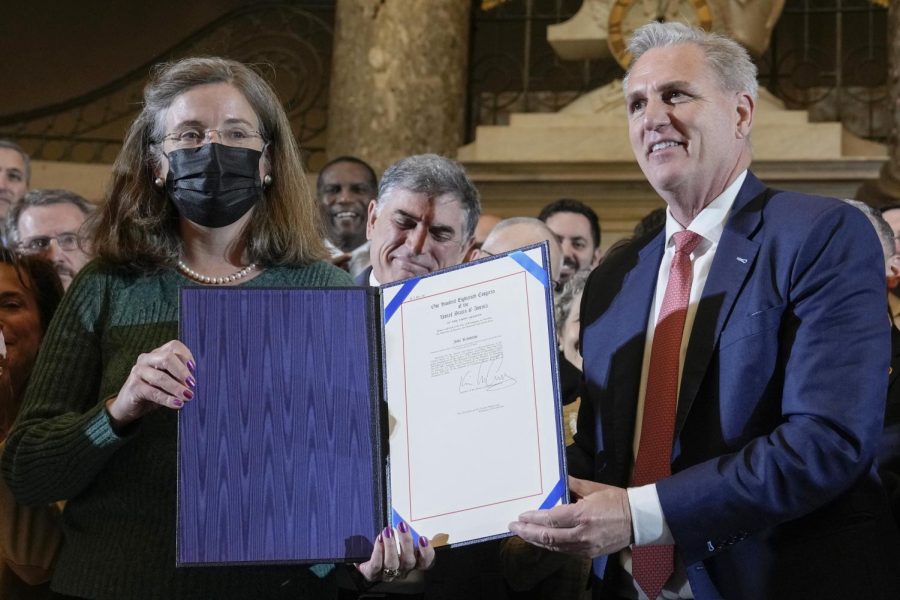Editorial | Congress voting down D.C. crime law shows the district needs statehood
House Speaker Kevin McCarthy of Calif. stands with Denise Rucker Krepp, a former advisory neighborhood commission member, as he holds a ceremony to nullify the D.C. crime bill on Friday, March 10, 2023, on Capitol Hill in Washington.
March 13, 2023
While the District of Columbia has 712,816 residents — higher than the populations of Vermont and Wyoming and comparable with states such as Delaware and Alaska — it doesn’t have statehood.
D.C residents have long grappled with the effects of statelessness, including having no Congressional representation, prompting the famous quote on their license plates — “Taxation without representation.” Soon, a more outright call for autonomy will grace their plates — “We demand statehood.”
Before the 1973 Home Rule Act granted the city the right to elect its own mayor and council, D.C. had no self-governing power. While this bill paved the way for greater representation and a chance for constituents to have their voices heard, it didn’t begin to solve the issue of federal oversight.
The Home Rule Act includes a provision mandating that Congress must review every bill D.C.’s city council passes, meaning the district’s autonomy is still severely limited. The oversight explains why D.C. council’s proposed criminal code — which hasn’t been revised since 1901 — turned into a contentious matter in the nation’s capital.
Some federal lawmakers took issue with the bill’s plan to lower maximum penalties for some violent crimes, even though many of the changes in the bill were not considered controversial. D.C.’s mayor and police chief also objected to aspects of the update for similar reasons.
Advocates of the bill argue that changes to maximum sentencing would align the code with the penalties judges actually dispense instead of arbitrarily inflated ones, but that argument wasn’t persuasive enough for most of Congress — some of whom are up for re-election in 2024. Lawmakers are seemingly attempting to gain political points with their voting base full of people who do not live in the District of Columbia.
For example, in reference to Democrats supposedly not taking violence in D.C seriously with this “soft-on-crime law,” Senator Cindy Hyde-Smith said, “The resolution represents our chance to say, ‘Enough is enough.’” While D.C.’s rise in crime is concerning, this kind of federal oversight seems unnecessary.
If all other states get to make decisions about their crime laws without national oversight, shouldn’t a place with a larger population than two states be due greater autonomy? Well, according to 81 senators and the president — no.
The strong Senate vote against the criminal code significantly setback the district’s hopes for statehood, even though efforts had seemingly gained ground under Democratic control in Congress. Now, with a Republican-controlled House, we’re seeing local law federally hampered for the first time in 30 years.
So while statehood seems like a distant reality, D.C. deserves equitable representation and the choice to have say over their politics without direct federal oversight.








